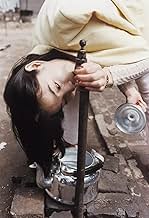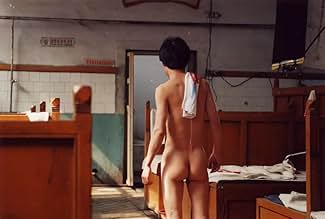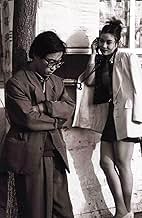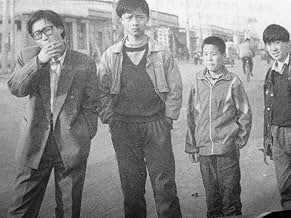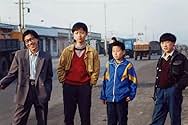PUNTUACIÓN EN IMDb
7,4/10
3,6 mil
TU PUNTUACIÓN
Una historia de amor entre un carterista y una chica que hace la calle.Una historia de amor entre un carterista y una chica que hace la calle.Una historia de amor entre un carterista y una chica que hace la calle.
- Premios
- 7 premios y 1 nominación en total
Reseñas destacadas
Xiao Wu is to me an incredible lively film.It's like the viewer is totally a part of the scenes he is seeing.the director is a genius in giving you the real-life sense.The raw way of the photography gives you an honest picture of a certain time in China's history... we follow a petty thief Xiau Wu in his 'struggle 'to survive.... everyone around him , his mates from the scenes have all sworn off their criminal pasts and are on the road to be normal citizens...not Xia Wu however.He seems not to be able to break with his 'old'life. What this film shows us in an incredible way to is a piece of Recent Chinese history...the emerging of private enterprise...filmed in the mid 90-ies we as viewers are made very much part of these developments. an excellent and very capturing film in every way ! great job done by the all amateur actors cast.Zhang Ke Jia did an unique job here !
Xiao Wu is a pickpocket in Beijing. Stuck on the bottom rung of the criminal ladder despite his advance into adult years, he heads a small group of thieving street urchins who haunt the back streets of the city. Xiao Wu is a surly character, prone to throwing away his cigarette ends when in other people's homes. His time is whiled away with games of Mahjong and American pool played out in the street and he has few close friends.
Xiao Wu's brother, Xiao Yong, once himself a petty thief, is now a cigarette trader and brothel-owner. Xiao Yong, shamed by his criminal roots and his brother's failure to move on from the same position, excludes Xiao Wu from his wedding invitations and refuses to accept his wedding gift of ill-gotten money. Later on, Xiao Wu also discovers the shame that his hardworking parents feel for their pickpocket son.
A sense develops that the world is moving on and that Xiao Wu is being left behind; this is increased by the ongoing police-led evictions from the street where he spends much of his time a new building project is on its way. Xiao Wu finds a glimmer of hope in his encounters with Mei Mei, an employee at the local brothel. The taciturn pickpocket opens up a little in her presence and the two of them bond, somewhat oddly from a Western perspective, through karaoke singing. Xiao Wu suddenly finds his singing voice when alone in a bathhouse; his plain voice resounds poignantly in the large, grimy, empty room. It is a rare moment of beauty.
When Xiao Wu buys a pager (state of the art in 1997) to keep in touch with Mei Mei it seems that he is starting to open up just a little to the changing world. But Mei Mei's sudden disappearance, along with his alienation from his family, leaves Xiao Wu without direction. A grim lack of purpose takes hold again. In the final frames of the film he is publicly humiliated, bringing the story to a sad end.
The footage in this film is much grainier than many people made be used to, but this is not necessarily a weakness: the image quality suits the grey, dilapidated city streets. The hand-held camera adds intimacy to the karaoke scenes and captures the distance between the two brothers as they walk separately through the same streets. The muffled state of the soundtrack takes some getting used to, but writer-director Zhang Ke Jia was clearly working on a limited budget for his first feature. The non-professional cast, however, is surprisingly effective; Hong Wei Wang is a real find, exuding a seedy charm in the lead role.
The Artificial Eye DVD which I watched this film on did not provide subtitles for many of the voices on radio and television, nor for some of the secondary characters, but there is an enormous amount of visual detail to take in as well. China simply does not feature enough on cinema screens, but this fine film suggests hope for the future.
Xiao Wu's brother, Xiao Yong, once himself a petty thief, is now a cigarette trader and brothel-owner. Xiao Yong, shamed by his criminal roots and his brother's failure to move on from the same position, excludes Xiao Wu from his wedding invitations and refuses to accept his wedding gift of ill-gotten money. Later on, Xiao Wu also discovers the shame that his hardworking parents feel for their pickpocket son.
A sense develops that the world is moving on and that Xiao Wu is being left behind; this is increased by the ongoing police-led evictions from the street where he spends much of his time a new building project is on its way. Xiao Wu finds a glimmer of hope in his encounters with Mei Mei, an employee at the local brothel. The taciturn pickpocket opens up a little in her presence and the two of them bond, somewhat oddly from a Western perspective, through karaoke singing. Xiao Wu suddenly finds his singing voice when alone in a bathhouse; his plain voice resounds poignantly in the large, grimy, empty room. It is a rare moment of beauty.
When Xiao Wu buys a pager (state of the art in 1997) to keep in touch with Mei Mei it seems that he is starting to open up just a little to the changing world. But Mei Mei's sudden disappearance, along with his alienation from his family, leaves Xiao Wu without direction. A grim lack of purpose takes hold again. In the final frames of the film he is publicly humiliated, bringing the story to a sad end.
The footage in this film is much grainier than many people made be used to, but this is not necessarily a weakness: the image quality suits the grey, dilapidated city streets. The hand-held camera adds intimacy to the karaoke scenes and captures the distance between the two brothers as they walk separately through the same streets. The muffled state of the soundtrack takes some getting used to, but writer-director Zhang Ke Jia was clearly working on a limited budget for his first feature. The non-professional cast, however, is surprisingly effective; Hong Wei Wang is a real find, exuding a seedy charm in the lead role.
The Artificial Eye DVD which I watched this film on did not provide subtitles for many of the voices on radio and television, nor for some of the secondary characters, but there is an enormous amount of visual detail to take in as well. China simply does not feature enough on cinema screens, but this fine film suggests hope for the future.
The sound mixing is garbage, with a substantial amount of noise. The dialect cannot be understood. The camera is shaky. The performance is pretty amateurish. The pace is slow. All in all, this film is an unwatchable mess.
English title had given (Bresson's treasure) this prominent Jia Zhangke's iconic Chinese rural magical realism masterpiece a kind of tone of obsessional Heimlich in our hero Wang Hongwei, who graduated from the same film school as Jia Zhangke, but credited as a "non-professional actor", it's weird, but pretty rarefied.
I don't know how Jia Zhangke created the perfect grotesque atmosphere between the two estranged or intimate conversations. His bravura handle of trims of pickpocketing details, with the remaining of Xiao Wu's personal life is brilliant.
He is a bad, quotidian-stolen pickpocket, but he never lost his soul as a generous, wholehearted Valentine and a brother.
The shaking camera is aptly combined with the realistic setting and crew. The performance is divine, especially Wang Hongwei, he looks fun and mysterious, charismatic.
The blackout of the romantic scene is a bravura technique. Wang Hongwei ascends.
I don't know how Jia Zhangke created the perfect grotesque atmosphere between the two estranged or intimate conversations. His bravura handle of trims of pickpocketing details, with the remaining of Xiao Wu's personal life is brilliant.
He is a bad, quotidian-stolen pickpocket, but he never lost his soul as a generous, wholehearted Valentine and a brother.
The shaking camera is aptly combined with the realistic setting and crew. The performance is divine, especially Wang Hongwei, he looks fun and mysterious, charismatic.
The blackout of the romantic scene is a bravura technique. Wang Hongwei ascends.
Unlike a lot of other contemporary Chinese films, Xiao Wu succeeds in gaining viewers empathy for the title character. We never really find out how the so-called "artisan pickpocket" got himself into the state he's in; it's almost as if he woke up one morning to find that he was alone and jobless at an age when he should be settling down like all of his friends. However, not knowing how he arrived at this point makes his growing desperation more tangible as we see him reaching out to everyone he can, only to be rejected.
Wang Hongwei is amazing as the title character, he makes it easy to relate to the character's loneliness and longing. Considering the actors in Xiao Wu are all amateurs, Wang's performance is even more amazing. Granted, he was given a great character to work with: in spite of his occupation, Xiao Wu is a nice guy. (His beautifully awkward relationship with the karaoke hostess is a fine example of this).
All in all, I think this is one of the best Chinese films from the past decade. The characters are better developed than in other contemporary films, and the story is neither contrived nor simplistic. Xiao Wu would seem to be a lot more accessible than other Chinese art films because it lacks the slow bits characteristic of that genre. I would highly recommend Xiao Wu to anyone interested in Chinese cinema.
Wang Hongwei is amazing as the title character, he makes it easy to relate to the character's loneliness and longing. Considering the actors in Xiao Wu are all amateurs, Wang's performance is even more amazing. Granted, he was given a great character to work with: in spite of his occupation, Xiao Wu is a nice guy. (His beautifully awkward relationship with the karaoke hostess is a fine example of this).
All in all, I think this is one of the best Chinese films from the past decade. The characters are better developed than in other contemporary films, and the story is neither contrived nor simplistic. Xiao Wu would seem to be a lot more accessible than other Chinese art films because it lacks the slow bits characteristic of that genre. I would highly recommend Xiao Wu to anyone interested in Chinese cinema.
¿Sabías que...?
- CuriosidadesJia Zhang-ke: the man sent by Xiao Yang to return Xiao Wu's wedding present.
- ConexionesReferenced in Ren xiao yao (2002)
Selecciones populares
Inicia sesión para calificar y añadir a tu lista para recibir recomendaciones personalizadas
- How long is Pickpocket?Con tecnología de Alexa
Detalles
Taquilla
- Recaudación en todo el mundo
- 1569 US$
- Duración
- 1h 50min(110 min)
- Color
- Relación de aspecto
- 1.37 : 1
Contribuir a esta página
Sugerir un cambio o añadir el contenido que falta

